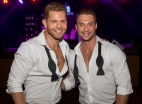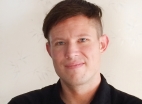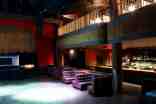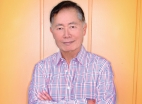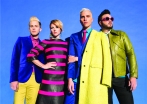Jam-Packed Weekend Roster of Events for AFAN’s 28th Annual Black & White Party
- August 7, 2014 - 2:12pm
Las Vegas’ favorite party of the year, Aid for AIDS of Nevada’s 28th Annual Black & White Party, returns to The Joint at the Hard Rock Hotel & Casino Las Vegas Aug. 23, and the $40 general admission ticket price includes three days of parties, including the city’s first T-Dance.
Friday, Aug. 22
Start the weekend with complimentary admission to the official kickoff party at Liaison Nightclub at Bally’s, the first gay nightclub in a Strip casino. With a high-end atmosphere, sexy live performance pieces and hot DJs, Liaison has quickly become the place to see and be seen, recently throwing Lance Bass’ release party for his new single.
Saturday, Aug. 23
The main event may be all black and white but it’s anything but basic. Party at The Joint at Hard Rock from 9 p.m. to 1 a.m. (VIP entry at 8 p.m.) with beats from DJ Axis and performances from the Strip’s hottest acts including Jabbawockeez, Melody Sweets, Sky Miles, Jubilee!, Chase Brown, Lorena Peril and more. Actor, comedian and breakout star of reality TV show “RuPaul’s Drag Race” Shangela (D.J. Pierce) will make a special appearance. Vegas’ top chefs and mixologists including Culinary Dropout, Maggiano’s, Pink Taco, 35 Steaks + Martinis, Jamba Juice, Popcorn Girl, Ferraro’s, desserts by Aliante Casino + Hotel and Back Bar USA will provide lavish indulgences. Head to the nearby Fruit Loop for the official after party at Piranha Nightclub, voted best gay club by the Las Vegas Review Journal.
Sunday, Aug. 24
A staple of gay culture worldwide, AFAN brings the legendary afternoon party T-Dance tradition to Las Vegas at Wynn’s Encore Beach Club 4pm-7pm with world famous DJ Diplo on the decks. Black & White Party attendees will enjoy complimentary admission, one complimentary drink and access to a special VIP area.
For the complete lineup and to buy tickets, visit the afanlv.org website. $125 VIP tickets with early entry to the Black & White Party at 8 p.m. are also available. Book a special room rate at Hard Rock for the weekend by visiting hardrockhotel.com or calling 800.343.4346 and using the code HAFAN14.
To learn more about AFAN, please visit afanlv.org
Local Spotlight - Derrek Spilsbury - Gay Mormon in Vegas
- August 7, 2014 - 2:03pm
How long have you lived in Las Vegas?
With the exception of some time in Utah and California and my time abroad in Europe, 25 years. I’m a native.
When did you know you were gay?
When I was 5 years old I watched The Never Ending Story. I had a huge crush on Atreyu, the kid with the horse. I guess I didn’t know what it was called back then, but once I hit puberty I realized that’s what they called it “being gay”.
What is one of the most difficult challenges being gay and Mormon?
The guilt. Mormon theology places great emphasis on what they call eternal marriage. In order to achieve the highest degree of glory one must be sealed to their spouse in the temple. Same-sex marriages are not allowed, so right off the bat, gay people are set up below their straight counterparts. Also, the paradigm of “Hellfire and Brimstone” as a punishment for sin caused a great deal of fear. Because homosexual acts are sins in the eyes of the Church, I experienced a tremendous amount of guilt growing up simply for my attraction to males.
What advice would you give someone who is struggling with being gay and Mormon?
For someone who is questioning whether or not to stay in the church or get out, my answer is emphatically this: get out and learn that God loves you just the way you are. Unless you plan to live a life of celibacy, you will never have full standing in the church. Even if you did remain celibate, without a wife and a family, you’re really not “one of them” in a purely cultural sense. For those who absolutely are determined to remain active in the church, I understand that there is a great need to be part of the family, part of the ward, part of “God’s Family” and “God’s Church”. I get it. But be aware that this is a long and lonely road. It is filled with self-loathing and is plagued with guilt. I do not recommend it. But no matter how bad it gets, please do not take your own life, as so many gay Mormons have done. There is plenty of love and acceptance out there waiting for you to accept. Please know that you are loved.
Goodbye Krave, Hello Equalibrium
- August 7, 2014 - 1:57pm
Only months away from what would be Krave’s 10 year anniversary, we received confirmation that on July 27th, 2014 Krave’s doors closed once again at what was to be their temporary home located at the Tommy Wind Theatre. This comes shortly after their previous downtown location slated as “Krave Massive” became what you could call a massive failure after a whirlwind of bad press due to the previous owner Kelly Murphy’s past of indiscretions which included financial impropriety and prison time. August 1994 in San Antonio, TX, Murphy pleaded guilty to bank fraud when he got caught using his 7-year-old son’s Social Security number to obtain a total amount of $73,500 on three different bank loans. Murphy was released from jail in December 1995.
On October 2nd, in an unusual hearing at the Las Vegas City Council Kelly Murphy’s two liquor licenses were denied and the publicly broadcast meeting ended Murphy’s nightclub career in Las Vegas and any chance of receiving further city funding. A gentlemen stating his name was Matthew Greppin known to everyone else in Las Vegas as Kelly Murphy’s longtime employee “Tyler Caiden or DJ Tyler Caiden” tried to convince the city council that he had just purchased drink and drag a day before the hearing. Later, the original owner of Krave, Sia Amiri, claimed that he had purchased the Krave Massive liquor licence. All claims were denied and in an immediate response Sia Amiri moved Krave into the old Empire Ballroom space to try and revitalize the name that Kelly Murphy had so badly tarnished with his questionable business practices such as the billboard above Piranha Nightclub, his office space across their street and his constant attacks on Las Vegas Pride with his own “Official Pride Events”.
Who will be Vegas’ next gay megaclub on the strip? The answer is club EQUALibrium. This 21,000 square foot family operated mega club that is actually located on the strip and not inside a casino, is the newest and largest gay nightclub to be introduced to Las Vegas. Following a multi million dollar renovation Arlene Riccardo says she was eager to launch EQUALibrium. Arlene, a beautiful blonde italian woman from New York, states “It’s always been one of my dreams to have my own gay club. People always say that I am a gay man trapped in a womans body, and its true. I love my gay friends and drag queens and I’m all about equality for everyone. That’s what inspired the name EQUALibrium, equal rights for everyone.” Arlene made it very clear that Club EQUALibrium is in no way shape or form involved with Krave, Kelly Murphy or Sia Amiri.
Club EQUALibrium has started operating Fridays, Saturdays and Sundays opening nightly at 10pm. The club features the only 18 and over event in Las Vegas every Sunday. Aerialist performers “The Sky Boys” bring exciting entertainment to the nightclub along with themed nights, drag performances, special guest celebrity performers, cash prizes, travel giveaways and more every weekend. The venue has absolutely everything. The two level nightclub features a massive theater stage for shows and concerts, a gorgeous balcony terrace with a view of the strip, over 40 VIP booths, 4 huge bars, a brand new state of the art sound and lighting system, confetti launchers, snow machines, and unique visualization shows. When asked about the locals, Arlene stated that “locals will always have an option for free entry on most nights. We love our locals, they are who we cater to more than anything, and they are who nevada needs to give equal rights to, marriage is for everyone, by the way.” The nightclub features the hottest male and female Go-Go’s on the strip, affordable drink prices such as $5 long islands on Saturdays and all you can drink liquor busts. The venue is located at 3765 Las Vegas Blvd. S. Las Vegas, NV 89109 across from the Monte Carlo in between Walgreens and Fatburger. For VIP reservations call 702-763-7077 and for more information visit: equalvegas.com
http://video.siretech.net/Sire/VegasCity/City%20Council/1419/1419.wmv
It’s Good to Be Takei - Actor-turned-activist talks social network resurgence, closeted actors and autographing private parts
- August 7, 2014 - 1:40pm
George Takei knows the power of a cat meme. Because of all things, it’s the pussy that gave him a platform and set the stage for something more than just pervy postings and silly jests: gay activism. Now, the 77-year-old iconic Hikaru Sulu on Star Trek from 1966-1969, isn’t only the voice of a generation – he’s the voice of generations. But how?
The actor, who swooshed out of the closet at the age of 68 to become a powerful LGBT advocate and social media magnate, reflects on all facets of his life during To Be Takei, a documentary viewable on DIRECTV through Aug. 6 and also in select theaters and VOD later this summer.
In the midst of traveling the Pride circuit, the cultural icon called in to chat about it being “high time” Star Trek cast a gay character (and why it hasn’t happened yet), how closeted actors are still common and – oh myyy! – autographing his fans’ private parts.
What’s the message you’ve been bringing with you to these Pride festivals?
That we’re making amazing progress, and that’s because all of the people in the community are pulling at the same wagon. We have some special change agents, people like Stephen Snyder-Hill, the soldier that spoke at the Republican Debate in 2011, where he asked whether any Republican candidate – when he or she becomes president, and also commander in chief of the military – would reinstate “Don’t Ask, Don’t Tell.” It was a legitimate question, and yet the Republican people who gathered at that debate booed an American soldier ... on the battlefield ... dodging martyrs. It was a shocking thing. But because of people like
him who have the courage to ask those questions and take principled stands, we’re making the progress that we are.
You’ve been an integral part of that progress. For someone who wasn’t out for most of his life, how surreal is it for you to be riding in a Pride parade at this point?
I lived most of my life closeted because I wanted my career. That was a heavy price to pay for it, because you’re living with the constant tension of exposure – somebody could expose me and that’s the end of my career.
It must’ve been my early 20s when Tab Hunter, who was a god of the box office at the time – blond, good looking, young – played the lead in almost every movie that was coming out. He was exposed as gay in one of the scandal sheets, and you never heard from him again. That puts the fear in you, and you’re always living with your guard up. You don’t know what or who might destroy your career, and so when you come out, you’re completely relieved of that tension. You can live fully as who you are.
I had an interesting experience: the State Department sent me on one big tour of South Korea and Japan, which culminated with U.S. ambassador to Japan, Caroline Kennedy, honoring me with a reception. As one of her guests, she had the first lady of Japan, the wife of Prime Minister Shinzo Abe, who told me that she had ridden in what she called a “Rainbow Pride Parade” in Tokyo this summer. Can you imagine the first lady of Japan riding in a Pride parade?
Changes are happening. Not only in the United States, but all over the world. It’s a very optimistic time, but we still have the Employment Non-Discrimination Act before us – you can be fired for no other reason than who you are. It’s the “Don’t Ask, Don’t Tell” of the civilian population. So, it is an exciting time – a time to be optimistic, because we’re making progress – but we still have a long way to go.
Your primary reason for staying closeted was to avoid sabotaging your career. How common do you think it is these days for actors to keep their sexuality concealed for that same reason?
It’s still not uncommon. There are actors who have to be living that double life. I won’t name them, but you know, it’s a decision that they have to make. It’s a very personal decision. I don’t know the specifics, but with society changing, they are seeming to be more and more like outdated dinosaurs who maintain that kind of life.
Are you saying you know people in showbiz who are closeted? Friends of yours?
I do. You know, when I was doing Star Trek my colleagues knew, but they’re good people, they’re cool, and they did not expose me. (Laughs) Well, one of them ... the fact that I am who I am went right over his head. I’ll leave it to you to guess whom.
You’re a real tease, George.
(Laughs)
In the last 10 years, you’ve really become quite the accidental activist, and because your parents come up often in the documentary, I’m wondering what you think they would say about your role as an LGBT role model?
Well, they’re both gone now. My father had passed long ago, and it’s one of my regrets in life – that I never came out to him. But I know he would’ve supported me. (He said he would) accept and support and love his son going into the acting arena. I mean, he did tell me: “Look at TV, look at movies, look at the kind of roles that Asians have to play – tiny roles to begin with, and stereotype roles at that – is that what you wanna go into?” I told my father: “Daddy, I will change it.” He supported me in that. I think he knew deep down who I was; he was waiting for me to come out to him.
When I came out to my mother, she had some difficulties, but she knew who (my now-husband) Brad was. Brad was in my life already, and she thought of him as my friend, but when I came out to her, the situation was changed. She already knew Brad for who he was and that he was a nice guy, so it wasn’t really that difficult. As life would have it, Brad and I took care of her in the last years of her life. She moved in with us. He became more a son to her than my own brother.
Your career resurgence is really something to marvel at. You know your way around social media like no 77-year-olds I know.
(Laughs) You’ve got a stereotype in your mind about 77-year-olds! There are a lot of us who are very comfortable with social media. My generation is not as out of touch with technology as you youngsters seem to think.
(Laughs) I’m very aware of this stereotype; I’m basing this off my own experience with my father. Recently, he posted a message for someone else on my wall.
You talk about your father – I have a sister who finally got a cell phone, but she leaves it at home when she leaves! What’s the point? (Laughs) So it’s not just you and your father. In my own family, I have that to deal with.
What role has humor played in how you present politics and social commentary on LGBT issues?
It is key to building your audience. The reason why I got so actively involved with social media is, it’s been my mission in life to raise the awareness of my childhood incarceration – imprisonment of Japanese-Americans simply because we happened to look like the people who bombed Pearl Harbor. So, I’ve been going on speaking tours to universities and doing corporate events, and we founded a museum called the Japanese American National Museum – we’re an affiliate of the Smithsonian – and we developed a musical based on the internment called Allegiance.
I thought I’d use social media (to promote it), but my base, when I started in 2010, was essentially made up of sci-fi geeks and nerds – my Star Trek audience – and I had to grow that. So, by trial and error I found that the humorous things, the funnies – or the cat memes – got the most likes and shares. Then I started concentrating more on that, and it started to explode.
It was really amazing how fast, and how big, your audience base can grow in social media. I discovered that humor was the key to growing the audience, and once the audience had grown to a certain size I started zinging them with social justice issues, LGBT issues and the internment of Japanese-Americans, as well as various other things ... like proper grammar!
Do you think we’ll ever see an out LGBT human on Star Trek?
I think now it’s high time. I did very quietly bring up the subject to (Star Trek screenwriter) Gene Roddenberry when we were starting our movie series – our feature film series – and he said with television he had to walk a very tight rope. You know, we were dealing with issues at that time – the civil rights movement, the Vietnam War, the Cold War – and that episode where Kirk kissed Uhura, a white man kissing a black woman, that was blacked out in all of the Southern states: Georgia, Alabama, Mississippi and Louisiana. Our ratings plummeted!
(Gene) said he knows that the LGBT issue is a civil rights issue, but he had to keep the show on the air as a television series, and if he pushed the envelope too far he wouldn’t be able to address any of the issues. He’d be canceled. Same thing with feature films now: bigger budget, higher risk. And he had said he’s predicating a 23rd century when the LGBT issue would not be an issue, but it is an issue of our times that we’re dealing with metaphorically in terms of science fiction and he wants to deal with it and still be able to make movies. He had said he hopes for the time that he will be able to do it.
Alas, Gene passed. It was in ’91 that he passed, and we’re 20 years-plus from that time. We’ve advanced with unimagined speed, and I think now it is high time Star Trek deal with the issue of LGBT equality. Now there are Star Trek actors who are out. Zachary Quinto, who plays Spock in the reboot, came out, and I am
out. With the two of us out, it is now safe for Star Trek to deal with LGBT equality.
Some fans have some very specific requests when they meet you. What’s been the most bizarre fan request you’ve experienced?
(Laughs) This is not PG – and this isn’t The Howard Stern Show – so I will be more circumspect about the bizarre requests that I get. I’ve been asked to autograph various body parts. And some are, um, very private parts. I’ll let your imagination go there.
Did you follow through on these requests?
I did!
Did these requests involve the front or the back?
Both! (Laughs) And some have gotten a tattoo artist to trace my autograph on those body parts. One woman displayed hers to me at a convention ... in the flesh!
Oh geez.
“Oh geez” – I love your reaction!
Neon Trees frontman talks reconciling gay Mormonism, atheist bashing and bear lust
- August 7, 2014 - 1:00pm
Neon Trees frontman Tyler Glenn is still figuring out what it means to be a gay Mormon. Not just how both modifiers can exist simultaneously, but if it’s even possible that they do. The alt musician spoke candidly on the heels of the band’s latest album, Pop Psychology, revealing how he’s not letting other people – even the Mormon Church – define his relationship with God, the gay atheists who lambasted him for standing by his beliefs and one of the reasons he recently came out: to find love.
What does being a gay Mormon mean to you? How are you able to be both without feeling like a contradiction?
Yeah, it’s interesting. Because there were things about the church they didn’t agree with, or they decided they wanted to live a different lifestyle regardless of sexuality, I had seen so many of my friends fall away from the church, even if they didn’t necessarily want to. They just felt like they had to pick one or the other.
In my life, I’ve never felt like I totally wanted to do everything that I was told I had to. I’ve always been that way, and I still have a lot of faith in God and in a lot of the teachings of the church. Obviously there are things I scratch my head at, but I’ve always been that way. I just wasn’t so quick to throw away that part of me and accept this other part of me, so I guess my situation is, I want to be open and honest and say I have these beliefs, that I have these feelings and I’ve acted on these feelings and this is who I am. I’m not ashamed of it. There have been a lot of people that have come up to me since (I came out) and said, “Thank you for being that way, because a lot of other people feel that way too.”
The Mormon Church is tolerant of homosexuality as long as you abstain from homosexual relations. That said, how are you able to reconcile Mormonism and homosexuality in terms of establishing physical relationships? What happens when you’re in a relationship, and are you in one?
I wish I could find a relationship. I don’t want to sound like I’m on the prowl, but when I came out, part of it was because I want to find love. I want to find somebody. I’ve never been all about the random hook-ups, although I’ve had those experiences, but that’s just not who I am. Coming out was a release. I want to meet someone in a more open, normal setting and not just have to be covert on apps and online – hiding it.
I think reconciling – I don’t know. I guess when it comes to it, I will. You know, I identify as Mormon because I believe in it, and regardless if, at some point, they decide to say, you can’t be (Mormon), I still won’t let someone here on Earth define my faith or my relationship with God and my beliefs. I will still identify with those beliefs.
So, if your bishop does not approve of your relationship with another man, you wouldn’t walk away from the church?
I don’t think I would be the one walking away, but I would probably be removed from the records. I mean, I do go occasionally, but I haven’t actively gone to church in about seven or eight years. I’ve always kind of felt like I didn’t fit in, but at the same time I love serving the mission, I love the teachings, I love The Book of Mormon. There are a lot of things I really, really believe in. It’s funny. Coming out as gay – it was almost harder to come out as Mormon. I was surprised how many people didn’t know I was Mormon, that I was raised that way. I got a lot of flak from atheists, which is interesting. A lot of gay atheists were applauding that I was coming out, but bashing me because I decided to still remain Mormon.
Of all the people you’ve come out to in your life – your family, the church, the whole world – whose acceptance meant the most to you?
I don’t know if it meant the most, but at the time it did. My producer (Tim Pagnotta) and one of my really close friends who I’ve written so much music with was the first person I came out to. I really wanted him to know what the songs were about. I got the courage to tell him and his reaction was so loving and so caring. I never associated any sort of love with being gay, and then he congratulated me and it changed my world. It encouraged me to tell my parents, my family and my band. It really gave me the courage to come out publicly. I don’t know if it means the most in retrospect, but it definitely had the biggest impact on me.
You mentioned hooking up and how it’s really not your thing. Has your religion made sex a struggle for you?
My situation was really odd. I got really good at compartmentalizing. I assume a lot of gay men who aren’t out get really good at that. There were times when I didn’t feel guilt. It was more just the anxiety from hiding it. In my 20s, I really started to express and explore that (sexual) side of me. It got to the point where I was 25, 26 and I was OK with being gay, but I was just at a crossroads with how to live that way, if it was even anyone’s business. There was a long period of time where I thought, “I don’t have to come out; it’s not a big deal.” But then watching so many gay documentaries and seeing the pain and frustration and sadness – that there’s still not full equality – made me see why it’s important to come out, because it is important.
You’re not dating anyone now, but do you see yourself getting married?
Yeah, I want a family. I do. I know my parents support that. I think they’re a little unprepared for me to bring someone home. I didn’t know if it was something that would be a part of my reality, but I’m really happy. I don’t know how to meet that man as of yet, but I would like to.
You’ve done some browsing on gay apps, presumably Grindr and Scruff. Are you on the apps often these days?
I actually try to stay off the apps, but I have been on them before.
Do you get recognized?
When I was on them I didn’t ever have a face photo, but I currently have GROWLr because I like masculine, hairy guys – I guess we call them bears – so I have the app for that. But I’m not actively on it, so I don’t know if people are recognizing me or not.
From what you’ve said, it doesn’t sound like the Mormon Church had anything to say about your coming out.
Right, no one said anything.
Do you think the church lets you get away with more as a gay Mormon because you’re in the limelight?
I think they’ve dealt with so much PR backlash and that I’m pretty inconsequential to that. I heard from a lot of members and I’ve heard a lot from local leaders and they’ve said it’s a good thing that I did this, but there’s been no official stance.
Do you think the Mormon Church will one day support gay marriage?
I know that in recent years there’s a lot more acceptance. I really hate that the overall doctrine uses the word “tolerance,” because I hate that word, but I think it’s a step in the right direction. There are a lot of gay couples that actually live in my mom’s city who are also Mormon that go to church and hold callings, so that’s something you don’t see in the media. They’re actually actively able to serve; they’re not married, but they live together and they’re able to hold callings. But I don’t know, man. I would love that, of course.
What would you tell a gay Mormon kid who’s experiencing the same struggle you once did?
I actually have talked to a lot of them. I would hate to tell them “come out” only to find themselves in a situation where they’re kicked out of their homes, because that happens still, even in Utah. But I do remind people that it’s important to be themselves. I think that there’s a time and a place to come out, and I don’t know if waiting till I was 30 was the best thing, but it definitely has turned out fine and I’m a happy person. I’ve encouraged (kids) to just get a good support group and make sure they’re telling people that will support them. Then, when they have that support, eventually it becomes easier to tell the people who maybe aren’t as supportive.
How has being an openly gay man influenced you on stage? Now that you’re not hiding, can you be yourself more than ever?
Oh yeah. Man, it’s crazy. Just being able to say, “I think that guy is cute” around my friends – just normal things that people get to do – I get to do that now. Not having to lead a different identity every time I’m around a different person is really freeing and it’s made performing really effortless.
